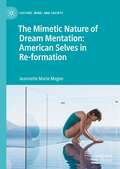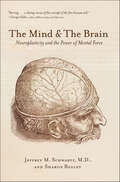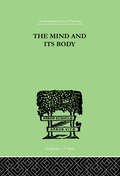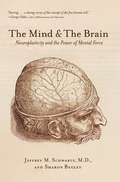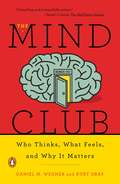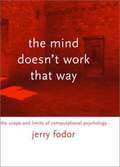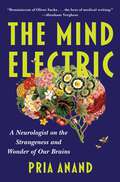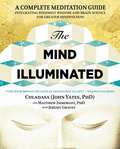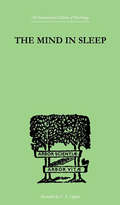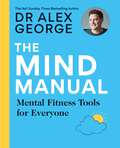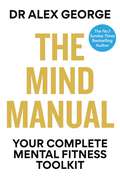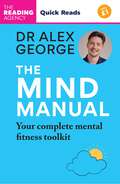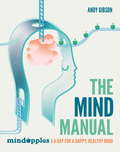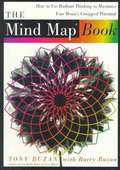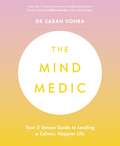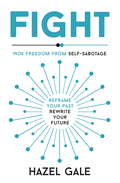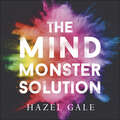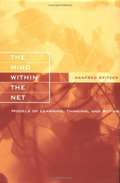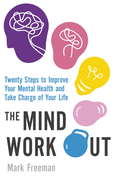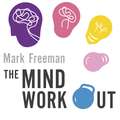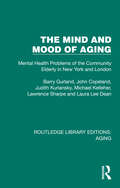- Table View
- List View
The Mimetic Nature of Dream Mentation: American Selves in Re-formation (Culture, Mind, and Society)
by Jeannette Marie MageoBased on over a decade of research, this book connects dream studies to cognitive anthropology, to perspectives in the humanities on mimesis, ambiguity, and metaphor, to current dream research in psychology, and to recent work in economic and political relations. Traveling the dreamscapes of a variety of young people, Mimesis and the Dream explores their encounters with American cultures and the identities that derive from these encounters. While ethnographies typically concern shared social habits and practices, this book concerns shared aspects of subjectivity and how people represent and think about them in dreams. Each chapter grounds theory in actual cases. It will be compelling to scholars in multiple disciplines and illustrates how dreaming offers insights into twenty-first century debates and problems within these disciplines, bringing a vital theoretically eclectic approach to dream studies.
The Mind & The Brain: Neuroplasticity and the Power of Mental Force
by Sharon Begley Jeffrey M. SchwartzA groundbreaking work of science that confirms, for the first time, the independent existence of the mind–and demonstrates the possibilities for human control over the workings of the brain.Conventional science has long held the position that 'the mind' is merely an illusion, a side effect of electrochemical activity in the physical brain. Now in paperback, Dr Jeffrey Schwartz and Sharon Begley's groundbreaking work, The Mind and the Brain, argues exactly the opposite: that the mind has a life of its own.Dr Schwartz, a leading researcher in brain dysfunctions, and Wall Street Journal science columnist Sharon Begley demonstrate that the human mind is an independent entity that can shape and control the functioning of the physical brain. Their work has its basis in our emerging understanding of adult neuroplasticity–the brain's ability to be rewired not just in childhood, but throughout life, a trait only recently established by neuroscientists. Through decades of work treating patients with obsessive–compulsive disorder (OCD), Schwartz made an extraordinary finding: while following the therapy he developed, his patients were effecting significant and lasting changes in their own neural pathways. It was a scientific first: by actively focusing their attention away from negative behaviors and toward more positive ones, Schwartz's patients were using their minds to reshape their brains–and discovering a thrilling new dimension to the concept of neuroplasticity. The Mind and the Brain follows Schwartz as he investigates this newly discovered power, which he calls self–directed neuroplasticity or, more simply, mental force. It describes his work with noted physicist Henry Stapp and connects the concept of 'mental force' with the ancient practice of mindfulness in Buddhist tradition. And it points to potential new applications that could transform the treatment of almost every variety of neurological dysfunction, from dyslexia to stroke–and could lead to new strategies to help us harness our mental powers. Yet as wondrous as these implications are, perhaps even more important is the philosophical dimension of Schwartz's work. For the existence of mental force offers convincing scientific evidence of human free will, and thus of man's inherent capacity for moral choice.
The Mind And Its Body: THE FOUNDATIONS OF PSYCHOLOGY
by Fox, CharlesFirst Published in 1999. Routledge is an imprint of Taylor & Francis, an informa company.
The Mind And The Brain: Neuroplasticity And The Power Of Mental Force
by Sharon Begley Jeffrey M. SchwartzA groundbreaking work of science that confirms, for the first time, the independent existence of the mind-and demonstrates the possibilities for human control over the workings of the brain. Conventional science has long held the position that 'the mind' is merely an illusion, a side effect of electrochemical activity in the physical brain. Now in paperback, Dr Jeffrey Schwartz and Sharon Begley's groundbreaking work, The Mind and the Brain, argues exactly the opposite: that the mind has a life of its own. Dr Schwartz, a leading researcher in brain dysfunctions, and Wall Street Journal science columnist Sharon Begley demonstrate that the human mind is an independent entity that can shape and control the functioning of the physical brain. Their work has its basis in our emerging understanding of adult neuroplasticity-the brain's ability to be rewired not just in childhood, but throughout life, a trait only recently established by neuroscientists. Through decades of work treating patients with obsessive-compulsive disorder (OCD), Schwartz made an extraordinary finding: while following the therapy he developed, his patients were effecting significant and lasting changes in their own neural pathways. It was a scientific first: by actively focusing their attention away from negative behaviors and toward more positive ones, Schwartz's patients were using their minds to reshape their brains-and discovering a thrilling new dimension to the concept of neuroplasticity. The Mind and the Brain follows Schwartz as he investigates this newly discovered power, which he calls self-directed neuroplasticity or, more simply, mental force. It describes his work with noted physicist Henry Stapp and connects the concept of 'mental force' with the ancient practice of mindfulness in Buddhist tradition. And it points to potential new applications that could transform the treatment of almost every variety of neurological dysfunction, from dyslexia to stroke-and could lead to new strategies to help us harness our mental powers. Yet as wondrous as these implications are, perhaps even more important is the philosophical dimension of Schwartz's work. For the existence of mental force offers convincing scientific evidence of human free will, and thus of man's inherent capacity for moral choice.
The Mind Club: Who Thinks, What Feels, and Why It Matters
by Daniel M. Wegner Kurt Gray"Daniel Wegner was one of psychology's most creative minds, and Kurt Gray was one of his most creative collaborators. The Mind Club describes their biggest idea together using thought-provoking examples, clever writing, and brilliant experiments. Essential reading for anyone who owns a mind and wants to know how to use it!"--Nicholas Epley, Professor of Behavioral Science, University of Chicago Booth School of Business and author of MindwiseFrom dogs to gods, the science of understanding mysterious minds--including your own. Nothing seems more real than the minds of other people. When you consider what your boss is thinking or whether your spouse is happy, you are admitting them into the "mind club." It's easy to assume other humans can think and feel, but what about a cow, a computer, a corporation? What kinds of mind do they have? Daniel M. Wegner and Kurt Gray are award-winning psychologists who have discovered that minds--while incredibly important--are a matter of perception. Their research opens a trove of new findings, with insights into human behavior that are fascinating, frightening and funny. The Mind Club explains why we love some animals and eat others, why people debate the existence of God so intensely, how good people can be so cruel, and why robots make such poor lovers. By investigating the mind perception of extraordinary targets--animals, machines, comatose people, god--Wegner and Gray explain what it means to have a mind, and why it matters so much. Fusing cutting-edge research and personal anecdotes, The Mind Club explores the moral dimensions of mind perception with wit and compassion, revealing the surprisingly simple basis for what compels us to love and hate, to harm and to protect.From the Hardcover edition.
The Mind Doesn't Work That Way: The Scope and Limits of Computational Psychology
by Jerry FodorJerry Fodor argues against the widely held view that mental processes are largely computations, that the architecture of cognition is massively modular, and that the explanation of our innate mental structure is basically Darwinian.
The Mind Electric: A Neurologist on the Strangeness and Wonder of Our Brains
by Pria AnandIn this collection of medical tales &“reminiscent of Oliver Sacks...the best of medical writing&” (Abraham Verghese, author of The Covenant of Water), a neurologist reckons with the stories we tell about our brains, and the stories our brains tell us.A girl believes she has been struck blind for stealing a kiss. A mother watches helplessly as each of her children is replaced by a changeling. A woman is haunted each month by the same four chords of a single song. In neurology, illness is inextricably linked with narrative, the clues to unraveling these mysteries hidden in both the details of a patient's story and the tells of their body. Stories are etched into the very structure of our brains, coded so deeply that the impulse for storytelling survives and even surges after the most devastating injuries. But our brains are also porous—the stories they concoct shaped by cultural narratives about bodies and illness that permeate the minds of doctors and patients alike. In the history of medicine, some stories are heard, while others—the narratives of women, of Black and brown people, of displaced people, of disempowered people—are too often dismissed. In The Mind Electric, neurologist Pria Anand reveals—through case study, history, fable, and memoir—all that the medical establishment has overlooked: the complexity and wonder of brains in health and in extremis, and the vast gray area between sanity and insanity, doctor and patient, and illness and wellness, each separated from the next by the thin veneer of a different story. Moving from the Boston hospital where she treats her patients, to her childhood years in India, to Isla Providencia in the Caribbean and to the Republic of Guinea in West Africa, she demonstrates again and again the compelling paradox at the heart of neurology: that even the most peculiar symptoms can show us something universal about ourselves as humans.
The Mind Illuminated: A Complete Meditation Guide Integrating Buddhist Wisdom and Brain Science for Greater Mindfulness
by Jeremy Graves John Yates Matthew ImmergutA revolutionary, science-based approach to meditation from a neuroscientist turned meditation master, The Mind Illuminated is an accessible, step-by-step toolkit for anyone looking to start—or improve—their daily meditation practice.The book that bestselling meditation teacher Sharon Salzberg raves “brings the path of meditation to life,” The Mind Illuminated is the first how-to meditation guide from a neuroscientist who is also an acclaimed meditation master. This innovative book offers a 10-stage program that is both deeply grounded in ancient spiritual teachings about mindfulness and holistic health, and also draws from the latest brain science to provide a roadmap for anyone interested in achieving the benefits of mindfulness. Dr. John Yates offers a new and fascinating model of how the mind works, including steps to overcome mind wandering and dullness, extending your attention span while meditating, and subduing subtle distractions. This groundbreaking manual provides illustrations and charts to help you work through each stage of the process, offering tools that work across all types of meditation practices. The Mind Illuminated is an essential read, whether you are a beginner wanting to establish your practice or a seasoned veteran ready to master the deepest state of peace and mindfulness.
The Mind In Sleep (International Library Of Psychology Ser.)
by Fortune, R FThis is Volume V of thirty-eight in the General Psychology series. First published in 1927, this study analyses the key elements of dreams of the author in a quest to understand how the mind functions when asleep and to explore free association.
The Mind Manual: Mental Fitness Tools for Everyone (Dr Alex George)
by Dr Alex GeorgeMental health matters! Learn how to assess your mental health today - and understand what's normal for you. Discover the seven universal truths that everyone should remember, and the mental fitness foundations that will boost you. And exercise your mind with the mental health toolkit that will help you thrive. Contents include -Part One: Your Mental Health Today-You are not alone-Know what feels normal for youPart Two: The Seven Universal Truths-Boundaries are beautiful-Mistakes are a must-havePart Three: Mental Fitness Foundations-It's good to talk-Why medical help mattersPart Four: Mental Health ToolkitResources
The Mind Manual: Mental Fitness Tools for Everyone (Dr Alex George)
by Dr Alex GeorgeMental health matters! Learn how to assess your mental health today - and understand what's normal for you. Discover the seven universal truths that everyone should remember, and the mental fitness foundations that will boost you. And exercise your mind with the mental health toolkit that will help you thrive. Contents include -Part One: Your Mental Health Today-You are not alone-Know what feels normal for youPart Two: The Seven Universal Truths-Boundaries are beautiful-Mistakes are a must-havePart Three: Mental Fitness Foundations-It's good to talk-Why medical help mattersPart Four: Mental Health ToolkitResources
The Mind Manual: Mental Fitness Tools for Everyone (Dr Alex George)
by Dr Alex GeorgeYour complete mental fitness toolkit by Dr Alex George'How are you? No really, how are you?'Learn how to assess your mental health today and understand what's normal for you.This is the mental health toolkit that will help you thrive.The Mind Manual is broken down into four parts with each one building on the last. Thegoal is to help you to establish your baseline, to know what peace feels like to you. Andthen to offer advice and tools to help you maintain that as much as possible.Part 1 looks at how to figure out where your baseline is and what normal feels like foryou. It's all about recognising your own needs so that you can best support yourselfwhen issues arise.Part 2 explores the seven universal truths and how they can support you when youmind is telling you lies. These seven truths are: Connection is your superpower; Sleepwill save you; Boundaries are beautiful; Mistakes are a must-have; Stress is the enemy;You are enough; Happiness is an inside job.Part 3 focuses on the foundations of mental fitness and explores the five different areasof life. These include what you eat and drink, how you release stress from your body,how much you move, how to talk out your thoughts and how to approach the medicalside of things.Part 4 is your mental health toolkit, where you'll find a wide range of worksheets andactivity tools to use. These can help while reading the book, but can also be usedregularly in your day-to-day life to check in on how you're coping.
The Mind Manual: Mental Fitness Tools for Everyone (Dr Alex George)
by Dr Alex GeorgeYour complete mental fitness toolkit by Dr Alex George'How are you? No really, how are you?'Learn how to assess your mental health today and understand what's normal for you.This is the mental health toolkit that will help you thrive.The Mind Manual is broken down into four parts with each one building on the last. Thegoal is to help you to establish your baseline, to know what peace feels like to you. Andthen to offer advice and tools to help you maintain that as much as possible.Part 1 looks at how to figure out where your baseline is and what normal feels like foryou. It's all about recognising your own needs so that you can best support yourselfwhen issues arise.Part 2 explores the seven universal truths and how they can support you when youmind is telling you lies. These seven truths are: Connection is your superpower; Sleepwill save you; Boundaries are beautiful; Mistakes are a must-have; Stress is the enemy;You are enough; Happiness is an inside job.Part 3 focuses on the foundations of mental fitness and explores the five different areasof life. These include what you eat and drink, how you release stress from your body,how much you move, how to talk out your thoughts and how to approach the medicalside of things.Part 4 is your mental health toolkit, where you'll find a wide range of worksheets andactivity tools to use. These can help while reading the book, but can also be usedregularly in your day-to-day life to check in on how you're coping.
The Mind Manual: Mental Fitness Tools for Everyone (Dr Alex George)
by Dr Alex GeorgeTHE SUNDAY TIMES BESTSELLER (December 2023)Mental health matters! Learn how to assess your mental health today - and understand what's normal for you. Discover the seven universal truths that everyone should remember, and the mental fitness foundations that will boost you. And exercise your mind with the mental health toolkit that will help you thrive.
The Mind Manual: Mental Fitness Tools for Everyone (Dr Alex George)
by Dr Alex GeorgeTHE SUNDAY TIMES BESTSELLER (December 2023)Mental health matters! Learn how to assess your mental health today - and understand what's normal for you. Discover the seven universal truths that everyone should remember, and the mental fitness foundations that will boost you. And exercise your mind with the mental health toolkit that will help you thrive.
The Mind Manual: Mindapples 5 a Day for a Happy, Healthy Mind
by Andy GibsonFrom the people who brought you the Mindapples "5-a-day for your mind" campaign, The Mind Manual is an accessible guide to what's going on in your head. From understanding how your own mind works, to making sense of the behaviour of others, this is a practical guide to managing your mind and using it to get the life you want. The book uses proven insights from neuroscience and psychology, filtered through the wisdom and experience of thousands of people in Mindapples' global community, to give you a crash-course in understanding your own mind. It will improve your well-being, your ability to cope with stress, and your understanding of yourself and others, and give you the tools you need to be your best self, with chapters including:How to Be YourselfHow to Keep CalmHow to Be HappyHow to Have a Healthy MindHow to Be WiseHow to Be ProductiveHow to Be ResilientHow to Be KindHow to Fall in Love
The Mind Manual: Mindapples 5 a Day for a Happy, Healthy Mind (Dr Alex George)
by Andy GibsonFrom the people who brought you the Mindapples "5-a-day for your mind" campaign, The Mind Manual is an accessible guide to what's going on in your head. From understanding how your own mind works, to making sense of the behaviour of others, this is a practical guide to managing your mind and using it to get the life you want. The book uses proven insights from neuroscience and psychology, filtered through the wisdom and experience of thousands of people in Mindapples' global community, to give you a crash-course in understanding your own mind. It will improve your well-being, your ability to cope with stress, and your understanding of yourself and others, and give you the tools you need to be your best self, with chapters including:How to Be YourselfHow to Keep CalmHow to Be HappyHow to Have a Healthy MindHow to Be WiseHow to Be ProductiveHow to Be ResilientHow to Be KindHow to Fall in Love
The Mind Map Book: How to Use Radiant Thinking to Maximize Your Brain's Untapped Potential
by Tony Buzan; Barry BuzanMind Mapping and Radiant Thinking are groundbreaking methods of accessing intelligence, developed over many years by the author, and here he provides a complete operating manual for all who want to use their brains to their fullest potential. It is a process currently used with extraordinary success by multinational corporations, leading universities, champion athletes, and outstanding artists.
The Mind Medic: Your 5 Senses Guide to Leading a Calmer, Happier Life
by Dr Sarah Vohra*For fans of Fearne Cotton's Calm and Matt Haig's Notes of a Nervous Planet*At some point in our lives we will all struggle with our mental health. But how many of us know what to actually do when we're struggling? How do you spot the warning signs and what can you do to stop things from escalating? From leading Consultant Psychiatrist, Dr Sarah Vohra (aka The Mind Medic), comes The 5 Senses Plan - a practical guide to improving your mental wellbeing using your 5 senses to help you along the way. The 5 Senses Plan offers expert advice and easy-to-follow exercises on how to optimise your senses, including:· SIGHT: how to see beyond the negative and use CBT techniques to reframe thought patterns· HEARING: exploring the role of a mentor and creating a space to listen and be listened to· SMELL: how to introduce calming scents into your life and the science behind aromatherapy · TOUCH: putting your worries in a worry box to help validate and contain your thoughts · TASTE: how to eat for your mind and discovering mood-boosting micronutrientsDr Vohra debunks the myths and conflicting advice surrounding mental health, setting out a 10-week plan to equip you with the knowledge and strategies for a happier, calmer mind. With The 5 Senses Plan, feel empowered with the knowledge to take control of your own mental health, the confidence to have honest conversations and the strength to seek support early.
The Mind Monster Solution: How to overcome self-sabotage and reclaim your life
by Hazel GaleThis paperback edition was formerly published in hardback under the title Fight.'Life-changing. One of the best books I've ever read!' - Dr Michelle Braude, author of The Food Effect Diet'Incredibly well-researched, practical and relatable. Clearly written by a true professional expert as well as an expert by experience. An excellent resource not only for those who want to address challenges and self-limiting patterns such as self-sabotage but also gain a comprehensive understanding of why they occur. Highly recommend.' - Shahroo Izadi, author of best-selling The Kindness MethodWhenever elite fighter Hazel Gale entered the ring, she felt fear. Not just the rational fear of being knocked out. But something deeper as well. The fear that she didn't deserve success, and that she would let everyone - especially herself - down. While others saw a confident world champion athlete, Hazel was plagued by anxiety, self-doubt and depression. It was these things - the monsters of her mind - that she felt were her most dangerous opponents, and she waged a war. It was that hard-fought internal battle that ultimately led her to burn out.Now a sought-after London therapist, Hazel has created a revolutionary system for overcoming fear, underperformance and self-sabotage. In The Mind Monster Solution, she uses personal anecdotes, practical exercises and innovative therapeutic tools to help you create a balanced life, rich with meaning, confidence and positivity. Written with humility and humour, this book will help you emerge victorious from your own battles, whatever they may be.
The Mind Monster Solution: How to overcome self-sabotage and reclaim your life
by Hazel GaleThis audiobook was formerly published under the title Fight.'Life-changing. One of the best books I've ever read!' - Dr Michelle Braude, author of The Food Effect DietWhenever elite fighter Hazel Gale entered the ring, she felt fear. Not just the rational fear of being knocked out. But something deeper as well. The fear that she didn't deserve success, and that she would let everyone - especially herself - down. While others saw a confident world champion athlete, Hazel was plagued by anxiety, self-doubt and depression. It was these things - the monsters of her mind - that she felt were her most dangerous opponents, and she waged a war. It was that hard-fought internal battle that ultimately led her to burn out.Now a sought-after London therapist, Hazel has created a revolutionary system for overcoming fear, underperformance and self-sabotage. In The Mind Monster Solution, she uses personal anecdotes, practical exercises and innovative therapeutic tools to help you create a balanced life, rich with meaning, confidence and positivity. Written with humility and humour, this audiobook will help you emerge victorious from your own battles, whatever they may be. The audiobook, read by author Hazel Gale, contains four additional guided meditations. (P)2018 Hodder & Stoughton Limited
The Mind Within the Net: Models of Learning, Thinking and Acting
by Manfred SpitzerIn The Mind within the Net, Manfred Spitzer shows how these models can fundamentally change how we think about learning, creativity, thinking, and acting, as well as such matters as schools, retirement homes, politics, and mental disorders.
The Mind Workout: Twenty steps to improve your mental health and take charge of your life
by Mark FreemanIt's well known that if you want to keep your body fit, you must do some regular exercise. But when it comes to our mental health, few of us take the time to maintain and improve it. For some reason, we expect to be in great mental shape without doing any work. And when we realise we're struggling, we look for a quick and easy fix instead of developing the skills that will help us in the future.Enter The Mind Workout - a home exercise programme for improving your mental health and fitness.Developed as a result of Mark Freeman's own recovery from mental illness, The Mind Workout combines mindfulness, Cognitive Behavioural Therapy (CBT) and Acceptance and Commitment Therapy (ACT). It outlines twenty easy-to-follow steps you can take to free yourself from the ways of thinking and behaving that cause mental health challenges in your life - from cutting out the compulsions that cause uncertainty, anxiety and distress to relieving stress and distraction. The Mind Workout is the key to making the switch from a frenetic, anxiety-driven life to one that's based on your core values. It will leave you feeling mentally stronger, fitter and better equipped to navigate the complexities of everyday life.
The Mind Workout: Twenty steps to improve your mental health and take charge of your life (Tom Thorne Novels #492)
by Mark FreemanIt's well known that if you want to keep your body fit, you must do some regular exercise. But when it comes to our mental health, few of us take the time to maintain and improve it. For some reason, we expect to be in great mental shape without doing any work. And when we realise we're struggling, we look for a quick and easy fix instead of developing the skills that will help us in the future.Enter The Mind Workout - a home exercise programme for improving your mental health and fitness.Developed as a result of Mark Freeman's own recovery from mental illness, The Mind Workout combines mindfulness, Cognitive Behavioural Therapy (CBT) and Acceptance and Commitment Therapy (ACT). It outlines twenty easy-to-follow steps you can take to free yourself from the ways of thinking and behaving that cause mental health challenges in your life - from cutting out the compulsions that cause uncertainty, anxiety and distress to relieving stress and distraction. The Mind Workout is the key to making the switch from a frenetic, anxiety-driven life to one that's based on your core values. It will leave you feeling mentally stronger, fitter and better equipped to navigate the complexities of everyday life.
The Mind and Mood of Aging: Mental Health Problems of the Community Elderly in New York and London (Routledge Library Editions: Aging)
by Barry Gurland Judith Kuriansky Michael Kelleher John Copeland Lawrence Sharpe Laura Lee DeanOriginally published in 1983, this cross-national study had three aims. First, to examine the cross-national differences among the elderly community in the prevalence of psychiatric problems and their relationship to other health and social problems. Second, to examine the differences in health care of aged people, with a view to providing a framework for improvement of health and support services to those elderly with psychiatric problems who reside in the community. Finally, the differences in the course and outcome of psychiatric disability with implications for the role of healthcare and community resources in reducing chronic disability or its consequences.
